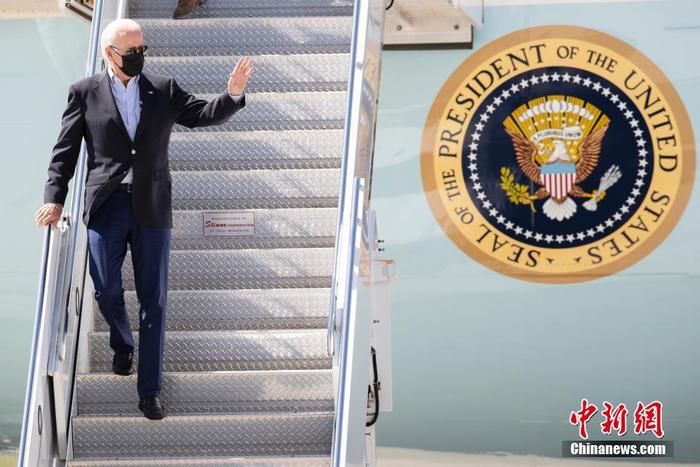Chinanews, October 29, a comprehensive report, on the 28th, U.S. President Biden, after postponing his trip to Europe for several hours and meeting with the House Democratic Caucus, finally gave a speech on the revised infrastructure spending bill.
He announced that a "historic economic framework" had been reached, and the bill was halved to 1.75 trillion US dollars. He also said that the new version of the bill has been supported by all 50 senators in the party and is convinced that it can pass the House of Representatives.
Data map: US President Biden.
Photo by China News Agency reporter Liao Pan
Before Biden set off on the 28th for Rome, Italy, to attend the G20 summit, he first went to Congress to meet with Democrats in the House of Representatives, and then returned to the White House to give a speech, announcing the "shrinked version" of the welfare spending bill.
He said: "After months of difficult and deliberate negotiations, I think we have-I know we have-reached a historic economic framework."
Biden said that he is confident that the plan can be passed by the Senate and win the support of all parties in the Democratic Party.
He pleaded with Democrats to put aside their differences and vote for the budget and the bipartisan infrastructure bill to advance their common agenda.
The White House acknowledged that this is a bill introduced after compromise, but it will still make "historic" investments in education, childcare, clean energy, and other social services.
Biden’s initial welfare spending bill caused serious divergence between the moderates and progressives in the party. The infrastructure bill of about 1.2 trillion US dollars (about 9.3 trillion Hong Kong dollars) was also tied up by the Democrats and could not be voted in Congress. Severely hit Biden's internal affairs plan.
After Biden's speech, several key Democrats issued a statement clearly stating that they had not promised to vote for the framework.
Arizona Senator Kyrsten Sinema expressed optimism about the progress of the talks, but stopped there. She said: "After months of fruitful and sincere negotiations with President Biden and the White House, we Significant progress has been made on the proposed budget coordination plan."
And another moderate Democrat, Senator Joe Manchin of West Virginia State Congress, also did not promise to support the new framework, only saying: "It is in the hands of the House of Representatives."
But a person close to the two senators said that they had privately expressed support for Biden's framework.
On the other hand, Speaker of the House of Representatives Pelosi hopes to vote on a related bipartisan-backed 1 trillion yuan infrastructure bill on the 28th, which aims to transform roads, bridges, railways and waterways in the United States.
People familiar with the matter said that she told lawmakers that she hoped to complete the vote before Biden arrived in Rome.
But the Progressive Democrat Rep. Pramila Jayapal said they have enough votes to prevent the bipartisan infrastructure bill from passing through.
Jayapar said that the progressive Democrats she represents support Biden's $1.75 trillion social expenditure and climate change bill, but only if they see the details of the relevant legislative language.

